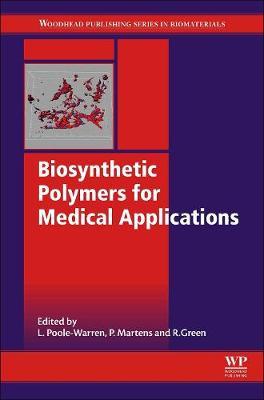Overview
Biosynthetic Polymers for Medical Applications provides the latest information on biopolymers, the polymers that have been produced from living organisms and are biodegradable in nature. These advanced materials are becoming increasingly important for medical applications due to their favorable properties, such as degradability and biocompatibility. This important book provides readers with a thorough review of the fundamentals of biosynthetic polymers and their applications. Part One covers the fundamentals of biosynthetic polymers for medical applications, while Part Two explores biosynthetic polymer coatings and surface modification. Subsequent sections discuss biosynthetic polymers for tissue engineering applications and how to conduct polymers for medical applications.
Full Product Details
Author: Laura Poole-Warren (University of New South Wales, Australia) ,
Penny Martens (University of New South Wales, Australia) ,
Rylie Green (University of New South Wales, Australia)
Publisher: Elsevier Science & Technology
Imprint: Woodhead Publishing Ltd
Dimensions:
Width: 15.20cm
, Height: 2.50cm
, Length: 22.90cm
Weight: 0.500kg
ISBN: 9781782421054
ISBN 10: 178242105
Pages: 358
Publication Date: 25 November 2015
Audience:
Professional and scholarly
,
Professional & Vocational
Format: Hardback
Publisher's Status: Active
Availability: Manufactured on demand

We will order this item for you from a manufactured on demand supplier.
Author Information
Professor Poole-Warren was awarded a PhD degree from the University of New South Wales in 1990 and held various appointments at UNSW after joining the academic staff in 1995. These include Associate Dean Research Training and Associate Dean Research in the Faculty of Engineering (2005-2009) and Professor in the Graduate School of Biomedical Engineering (2009). She was appointed Dean of Graduate Research in 2010 and Pro-Vice Chancellor (Research Training) in 2012.Professor Poole-Warren continues to lead a research group in biomedical engineering focusing on design and understanding of biosynthetic polymers for medical applications. Dr Penny Martens is a Senior Lecturer with the Graduate School of Biomedical Engineering. Her research focuses on the use of biosynthetic hydrogels for a variety of biomedical applications, including diabetes treatment, neural electrodes and cartilage repair. Dr Rylie Green is a Research Fellow with the Graduate School of Biomedical Engineering. Dr Green’s research has been focused on developing bioactive conducting polymers for application to medical electrodes, with a specific focus on vision prostheses. More recently Dr Green has been exploring hybrids of conducting polymers and hydrogels to reduce strain mismatch with neural tissue and improve long-term cell interactions at the neural interface through drug delivery.




